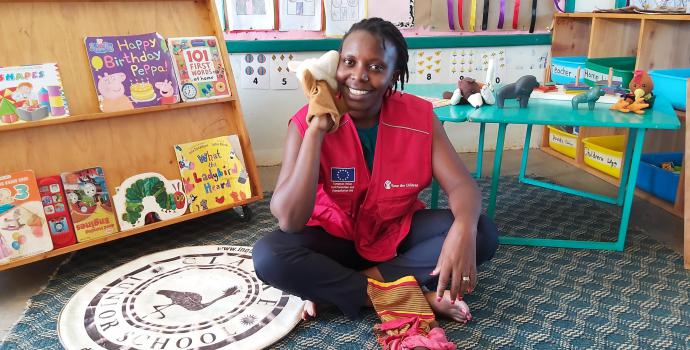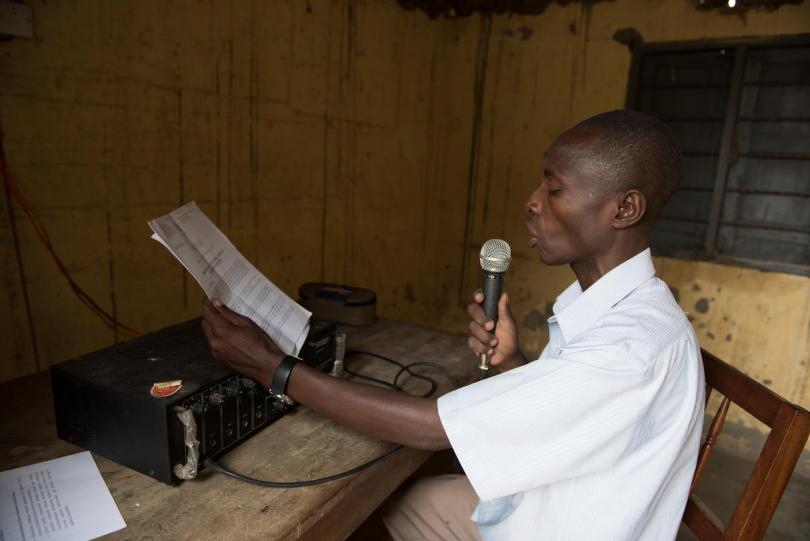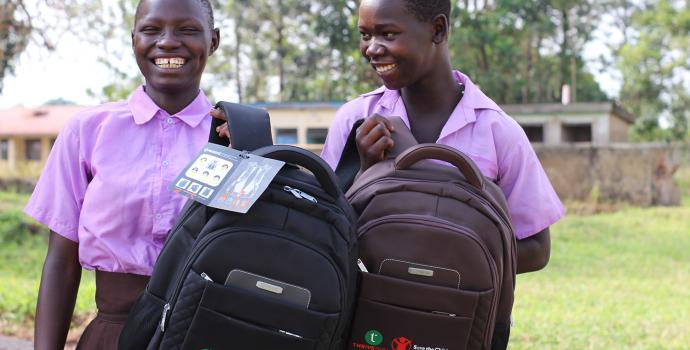Keeping children learning and safe during Covid-19

Above: Save the Children staff filming lessons and health messages for children, to be broadcast on national TV while schools are closed, in partnership with teachers from Clarke Junior School in Kampala
Uganda has joined the growing number of countries to close all schools to try and stop the spread of COVID-19.
51,000 learning institutions have closed for an initial 30 days, but it’s likely this will be extended. This means 15 million children in Uganda are out of school.
For many vulnerable children schools not only provide education – they also provide protection from violence and abuse, a safe place of routine and normalcy, and are the main source of safe water, nutrition and mental health support.
If children are not provided with a routine of learning at home to replace school, they will face increased risks such as physical and sexual abuse, hazardous and exploitative child labour, child marriage and early pregnancy. There will also be additional burden on girls, who at home often absorb the extra work of caring for other children and are more exposed to domestic violence. Without a learning routine, children are also more likely to play and gather in groups, putting them at further risk of spreading the virus.
That’s why closing schools must not mean suspending learning.
At this critical time it’s vital that international governments and donors provide funding to keep children learning and safe while at home.
Together with 15 other education NGOs in Uganda, we’ve produced a short briefing paper on how this can be done. We're making six recommendations:
1. Ensure that education is a core part of the COVID-19 response and is adequately funded from the start
There is overwhelming evidence that the longer children are out of school, the greater the risk of them never returning. There is a window of opportunity to set up learning systems that could continue throughout the response – but the window will shrink as restrictions on movement become greater, so it is essential that education is included and funded from the start.
2. Align funding and activities to support government response plans
The Ministry of Education and Sports, with support from UNICEF and NGOs, has quickly developed an Education Preparedness and Response Plan for COVID-19. Donors should align their funding to this plan
3. Support alternative and informal learning to continue while schools are closed
The closure of schools inevitably makes learning more challenging, but there are many practical ways to keep children learning even in these circumstances. Different approaches will be required for different communities, children and local contexts, but donors should consider supporting activities such as:
- Home learning kits, including reading material and exercises which can be done by children at home, either on their own or with parents and caregivers. These can be distributed to households now, but the window for doing so is rapidly shrinking.
- Distance learning and use of mass media: Radio broadcasts can be an effective way to support home learning, either through structured lessons, short messages or communal reading. 87% of Ugandan households have a working radio compared to 35% with a TV and 10% with internet access. This varies in some communities, such as refugee settlements where radio and phone network is limited, but even there, radio is generally the most trusted source of information. In communities without network, mobile loudspeakers can communicate to large numbers of people. Newspaper supplements targeted at children have also had proven impact in improving literacy and providing critical information; while in some areas mobile phone apps may be viable. The special needs of children with disabilities should be considered and learning materials should be adapted and inclusive.

Above: Community radio spreading messages in rural western Uganda.
- Supporting community groups. We work with a range of community structures which offer a potentially key resource for maintaining and promoting learning – such as Parent Teacher Associations, Community-Based Volunteers and School Management Committees. Members of these groups are also parents, respected in their communities. They can not only can support learning activities but can also role model positive practices for their neighbours and link with other vulnerable families.
- Enhancing literacy and numeracy skills. NGOs have set up book banks and reading clubs in many communities, and these are likely to need increased stock and replenishing, in line with Government guidelines on contact and gathering, so that children can keep reading. These could ideally be accompanied by radio programmes to promote communal reading.
- Paying teacher and staff salaries. Uganda already has a shortage of teachers, who are low paid and over-stretched. The government plan has stressed the importance of teachers continuing to be paid while schools are closed and as the cost of living rises, so that they can support home learning activities, keep contact with communities, send advice through phone/SMS/radio, and be ready for when schools reopen. Donors should support this with additional funding.
- Supporting teacher networks: WhatsApp and other social media have shown great potential in bringing teachers together in virtual groups to share resources and methods of teaching remotely.
4. Support planning to prepare for schools to reopen safely
While immediate priorities are on maintaining learning, it is important that schools are ready for children to return as soon as it is safe. School facilities should not be used for public health interventions or as isolation units during the outbreak, to avoid the risk of contamination and delayed return to school. Lessons from West Africa’s Ebola response show that fear can linger for a long time after the outbreak is contained – e.g. parents were reluctant to let their children return to the same schools as children and teachers who had survived Ebola.
Communities in Uganda are already afraid, and significant community mobilisation efforts will be needed to reassure teachers, learners and parents when it is safe to return to school. It is critical that preparations start early to develop guidance and materials to support catch-up classes and short-term bridging. The school calendar and holiday time will need to be revised to ensure children can still attend school for the full number of weeks.
5. Ensure that children are protected from harm
Given the increased risks,education activities must be closely coordinated and aligned with child protection activities. Teachers can be valuable resources tasked to identify at-risk children (such as child-headed households) who will be particularly vulnerable with schools closed, and support monitoring by para-social workers.
6. Ensure that the most vulnerable children, such as refugees and children with disabilities, have access to learning
Uganda hosts 1.4 million refugees – the third most in the world – and 60 percent are children. The closure of schools comes at a particularly vulnerable time, as lack of funding has forced the World Food Programme to announce a 30% cut in food assistance to refugees from April, which will put further financial strain on families. If their education stops completely now, many children are likely to have to go to work and are highly unlikely to return to education. Remote learning responses should be designed in recognition that many refugee communities have poor phone network, which may make traditional home teaching more effective than technology-based approaches.
Other children face similar uncertainty – such as children with disabilities, who already face enormous challenges accessing school, and adolescent girls who often drop out of education completely after becoming pregnant or being married off young, which is likely to increase.




